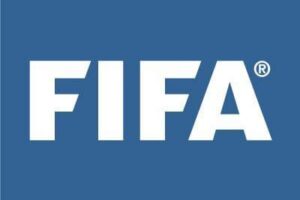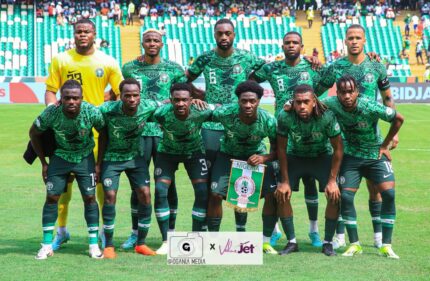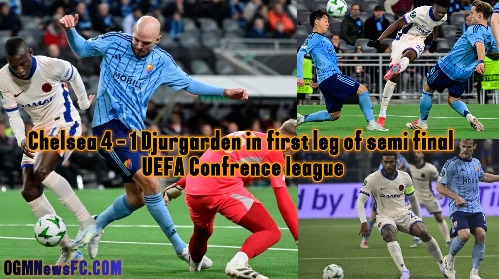The Confederation of African Football (CAF) is set to deliver its ruling on the unresolved Africa Cup of Nations (AFCON) qualifying Group D fixture between Libya and Nigeria. The match, originally scheduled for October 15 at the Benina Martyrs Stadium in Benghazi, was unexpectedly canceled, leading to an official complaint lodged by the Nigerian Football Federation (NFF). According to the Libyan Al-Ahrar Channel, CAF’s Disciplinary Committee will announce its decision on Wednesday, October 25.
The match’s first leg, held in Nigeria, ended 1-0 in favor of the Super Eagles, but tensions surrounding the return fixture have since escalated. Both sides have exchanged accusations over the circumstances leading to the game’s cancellation, with Libya submitting detailed documentation to CAF to defend its position. As the continental football body prepares to make its decision, this issue has drawn significant attention from football fans across Africa.
Background: The Controversial First and Second Legs
The encounter between Libya and Nigeria has been contentious since the first leg. Held in Nigeria, the match ended with a narrow 1-0 victory for the Super Eagles, but Libyan officials later claimed that they were subjected to mistreatment during their stay. The Libyan Football Federation submitted documents and reports to CAF, detailing their alleged ordeal during the first leg. A specialized lawyer was appointed by the Federation to handle the case, compiling evidence to defend Libya’s stance.
The situation deteriorated when the second leg, set to be played at the Benina Martyrs Stadium in Benghazi, was canceled just hours before kick-off. Libya’s 10,550-capacity stadium was prepared to host the game, but Nigeria’s players faced significant difficulties upon their arrival. Their flight was diverted to Al Abraq International Airport, located three hours away from Benghazi, and they were reportedly detained for nearly 17 hours under harsh conditions. This led to the Nigerian team’s decision to return home, prompting CAF to cancel the fixture.
Libya’s Position and Legal Action
The Libyan Football Federation has strongly condemned the actions of the Nigerian team. In a statement issued on Monday, the Federation criticized Nigeria’s refusal to play the match, emphasizing that all legal measures would be pursued to safeguard Libya’s interests. According to the Federation, they fully cooperated with the Nigerian delegation, contrary to claims made by Nigeria.
Libya also referenced their own challenging experience during the first leg in Nigeria, noting that their treatment in Nigeria was far worse than what the Nigerian team faced in Libya. In their official documents submitted to CAF, Libya highlighted these grievances, arguing that Nigeria’s reaction to their flight diversion was disproportionate and unjustified. The Federation hopes that CAF will recognize the efforts they made to ensure the game went ahead and will rule in their favor.
Nigeria’s Complaint and CAF’s Response
Nigeria’s Football Federation filed an official complaint with CAF, accusing Libya of intentionally subjecting their players to dangerous and inhumane conditions. The Nigerian delegation’s ordeal at Al Abraq International Airport lasted nearly 17 hours, with reports stating that the players were left traumatized and unable to continue with the match. CAF responded swiftly by removing the match from its official calendar and referring the case to its Disciplinary Committee.
CAF expressed concern over the situation, describing Nigeria’s treatment as “extremely dangerous.” The continental football governing body stated that it had been in contact with both Libyan and Nigerian authorities and would take appropriate disciplinary measures against those found guilty of violating regulations. CAF’s ruling is expected to set a precedent for future fixtures, especially concerning the safety and welfare of players.
What to Expect from CAF’s Ruling
As the football community awaits CAF’s decision, the outcome will likely have a significant impact on both teams’ AFCON qualification hopes. Should CAF rule in favor of Nigeria, the Super Eagles could be awarded three points, boosting their chances of securing a spot in the tournament. However, if Libya’s defense is successful, the match may be rescheduled, or an alternative penalty may be imposed on Nigeria for failing to participate.
Both nations are keen to see a fair resolution, but tensions remain high as accusations continue to be exchanged. The Libyan Football Federation insists that they followed all necessary protocols, while Nigeria believes their treatment in Libya was inexcusable. CAF’s decision on Wednesday will not only determine the fate of this fixture but also serve as a critical lesson in ensuring player safety and proper coordination in international football matches.














